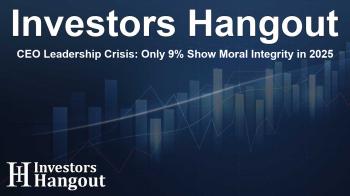CEO Leadership Crisis: Only 9% Show Moral Integrity in 2025

Understanding the Leadership Gap: A Call for Moral Integrity
New data shows that while the demand for moral leadership is at an all-time high, supply remains critically low.
A recent report sheds light on the current landscape of leadership among U.S. CEOs, revealing a concerning trend that only 9% are effectively demonstrating the behaviors associated with moral leadership. The report indicates that despite a surge in demand from employees for ethical guidance and principles, the supply of such leadership is alarmingly inadequate. The findings come from a comprehensive study undertaken by a prominent organization dedicated to fostering moral leadership.
The Demand for Moral Leadership
In today’s business environment, employees are increasingly vocal about their desire for leaders who exemplify ethical behavior. A staggering 95% of workers believe that moral leadership is more crucial than ever, reflecting a significant rise from 86% just a few years ago. This growing urgency emphasizes not just a preference but an essential need for leaders who prioritize principles over self-interest in their decision-making processes.
Measuring Effective Leadership
The report analyzed feedback from over 2,000 workers, assessing various leadership behaviors and practices. Participants were asked to evaluate how leaders demonstrate ethical decision-making, build trust, and foster an inclusive culture. Leaders who exhibit moral authority encourage collaboration and respect diverse viewpoints, which directly influences the overall workplace atmosphere.
Key Findings on Leadership Practices
This year's report explores several key areas where ethical leaders significantly impact their organizations:
- Moral leaders deliver better business results: Organizations led by ethical leaders enjoy higher customer satisfaction rates and resilience in economic downturns.
- Moral leaders inspire employee loyalty: Employees under ethical leadership are less likely to seek new job opportunities, fostering a more stable workforce.
- Moral leaders promote innovation: An environment where employees feel empowered to express their ideas and engage in constructive dialogue leads to greater creativity within teams.
For example, 74% of employees report satisfaction with their organization's customer service when led by top-tier moral leaders, contrasted with only 13% in organizations with lower leadership tiers. Furthermore, trust and loyalty within teams are visibly stronger under moral leadership, demonstrating how crucial it is to cultivate such qualities among leaders.
Encouraging Moral Leadership Development
CEO and leadership coach Dov Seidman emphasized the need for a new generation of leaders who can navigate the complexities of the 21st century by leading with moral authority. His advocacy for nurturing these ethical leaders is a call to action for organizations to invest in moral leadership training and development. The report serves not merely as a critique of current leadership deficiencies but as a blueprint for building more effective, moral leaders across all sectors.
The Path Forward
Seidman encourages leaders to embrace opportunities for self-improvement in their moral authority. The report outlines practical steps that can help leaders reinforce their ethical practices, build trust, and inspire others to take ownership of their roles within their organizations. With the foundation of moral leadership established, organizations can unlock better performance, innovation, and employee satisfaction.
About the Research Organization
The organization behind this study is focused on promoting moral leadership and principled decision-making. Through empirical research and real-world application of philosophical frameworks, they aim to prepare institutions to adapt to the challenges posed by rapid social, economic, and technological changes in the contemporary landscape.
Their mission is to create a culture that fosters ethical behavior at all levels of leadership, working towards a more just and sustainable society.
Frequently Asked Questions
What is the main finding of the report regarding CEOs?
The report reveals that only 9% of CEOs demonstrate effective moral leadership despite high demand from employees.
How many employees support the importance of moral leadership?
95% of employees believe that moral leadership is crucial in today's workplace.
What are some benefits of having moral leaders in organizations?
Moral leaders contribute to higher employee satisfaction, improved customer services, and enhanced organizational resilience.
Who conducted the study on moral leadership?
The study was conducted by a prominent organization focused on promoting ethical leadership and principled decision-making.
What does the future hold for moral leadership in business?
There is an increasing focus on developing ethical leaders who can navigate challenges while fostering a trusting and innovative workplace culture.
About Investors Hangout
Investors Hangout is a leading online stock forum for financial discussion and learning, offering a wide range of free tools and resources. It draws in traders of all levels, who exchange market knowledge, investigate trading tactics, and keep an eye on industry developments in real time. Featuring financial articles, stock message boards, quotes, charts, company profiles, and live news updates. Through cooperative learning and a wealth of informational resources, it helps users from novices creating their first portfolios to experts honing their techniques. Join Investors Hangout today: https://investorshangout.com/
Disclaimer: The content of this article is solely for general informational purposes only; it does not represent legal, financial, or investment advice. Investors Hangout does not offer financial advice; the author is not a licensed financial advisor. Consult a qualified advisor before making any financial or investment decisions based on this article. The author's interpretation of publicly available data presented here; as a result, they should not be taken as advice to purchase, sell, or hold any securities mentioned or any other investments. If any of the material offered here is inaccurate, please contact us for corrections.
